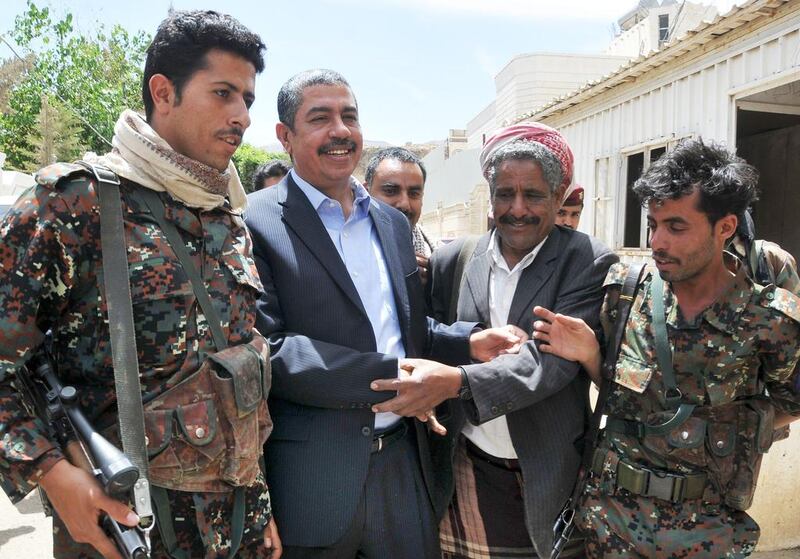SANAA // Opposition parties say the release of Yemen’s prime minister and top cabinet officials was not a sign of goodwill by the Houthis, but a result of growing public anger at the Shiite rebels’ takeover.
The Houthis, a group with roots to the Zaidi sect of Shiite Islam, on Monday lifted the house arrest of Khaled Bahah and members of his cabinet after two months, citing it as a “goodwill gesture”.
However, the same day, the Houthi-led Supreme Security Council curently ruling Yemen changed 14 top officials within the country’s air force – including the force’s chief who refused to take orders from the rebel group – and replaced them with Houthi loyalists.
It comes just two months after the rebels were at the peak of their power after taking over Sanaa and forcing president Abdrabu Mansour Hadi, Mr Bahah and his entire cabinet to resign.
This opened the doors for them to implement “the constitutional declaration” to dissolve parliament and form a transitional council.
No one stood against them then as internal, regional and international powers braced themselves for the new reality in Yemen.
Most foreign embassies in Sanaa evacuated and diplomats fled the country under security threats.
Even Saudi Arabia, the main powerbroker in Yemeni politics for the last five decades, halted its diplomatic mission in Sanaa, along with the UAE and other GCC countries, and prepared itself for a new era, where its arch enemy, Iran, was a strong supporter of the Houthis.
Political parties that opposed the Houthis were threatened and hundreds of anti-Houthi politicians and activists were beaten, arrested or kidnapped. Yemen was witnessing a dramatic shift of alliances, and Iran was suddenly the country’s main foreign ally.
The Houthis took control of the Yemeni army and the air force and assigned loyalists to key military positions while still in control of tens of thousands of militants who helped them take over Sanaa and other provinces.
The odds of the Houthis facing any obstacles then were very slim, but Yemen has always been unpredictable.
On February 21, Mr Hadi managed to escape a month-long house arrest in Sanaa. He headed to the southern province of Aden where he has a strong support base. From there, he withdrew his resignation and reclaimed his presidency.
Since then, Mr Hadi has regained international recognition as the country’s president and has been operating out of Aden.
Most of Yemen’s political parties, who were sidelined by the Houthis, saw new hope and announced their allegiance to Mr Hadi.
But the Houthis were undeterred and assigned the ruling Supreme Security Council with Mahmood Al Subaihi, who was defence minister under Mr Hadi’s rule, as its head.
However, two weeks later, Mr Al Subaihi himself escaped to Aden and announced his support for Mr Hadi.
Meanwhile, as Mr Hadi was regrouping in Aden, the Houthis were dealing with near economic collapse in Sanaa.
Tens of thousands of jobs have been lost since the Shiite rebels took control of Sanaa in September, mainly due to the evacuation of foreign diplomats and foreign oil investments. Blackouts of at least 14 hours continue on a daily basis. Thousands of public employees have yet to receive their salaries.
The central bank says Yemen’s foreign reserves dropped 6 per cent in January. Local investors quickly lost their confidence in the local currency and reverted to the US dollar.
Seeking a breakthrough, the Houthis sent a senior delegation to Iran for two weeks. A top Houthi official within the delegation told The National that Iran promised a US$2 billion (Dh7.3bn) trust fund for the Sanaa Central Bank to stabilise its economy and currency.
He said Tehran also agreed to fund an electricity power station with a capacity of 165 megawatt, and provide maintenance for the Mareb power station, which serves 70 per cent of Yemen’s population. In return, Iran wanted to sign a long term deal that grants Tehran presence near the strategic Mandeb Strait, which links the Indian Ocean to the Red Sea and Suez Canal, through a development project for the Yemeni port city of Hodeidah.
“Yemen will be the least to suffer from Iran’s presence near Bab Al Mandeb since it doesn’t have oil shipments (going through that route). Nations opposing Iran will regret turning a blind eye to Iran and allow it presence near one of the world’s most important shipping routes,” said Ali Al Jaradi, head of the media unit for Yemen’s Islah party, the country largest opposition group.
But Iran’s promises are easier said than done. It would take months before the first major tranche of Iranian financial support arrives in Yemen.
Amid growing public anger, opposing factions in Houthi-controlled areas are already gaining ground.
Earlier this week, Houthi opponents announced the formation of the National Rescue Coalition, which aims to unite players from difference regional and ideological backgrounds across Yemen against the Houthis and restore the authority of the state.
Sixty-five political parties, NGOs and movements pledged their support for the coalition, which received the backing of Saudi Arabia.
As UN-sponsored negotiations continue for the third month, a deal is far from being reached. Factions opposing the Houthis have stalled talks knowing that any signed deal will grant the Houthis recognition and legalise their coup and takeover of the government.
In the meantime, Saudi Arabia has been actively involved in negotiations with Yemen’s southern leaders and those living in exile.
“President Hadi’s escape from Sanaa gave new life to the Saudis, but both still need more time in order to put together the final pieces of the broader anti-Houthi alliance in Yemen,” said Baligh Al Mikhlafi, the spokesperson for the neutral Justice and Building Parties.
“This is just the beginning of a completely new chapter on Yemen and no one knows what’s going to happen next,” Mr Al Mikhlafi said.
foreign.desk@thenational.ae





